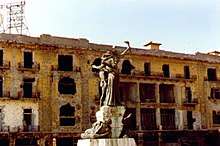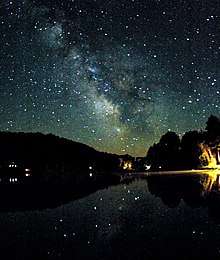We, we know the individuality that isolates the man from other men, the either/or, the lonely-one that leads the flesh to clothing, jewelry, and land, the solitude of sight that separates the people from the people, flesh from flesh, that jams material between the spirit and the spirit. We have suffered witness to these pitiful, and murdering, masquerade extensions of the self. Instead, we choose a real, a living enlargement of our only life. We choose community.
June Millicent Jordan (9 July 1936 – 14 June 2002) was an African-American bisexual political activist, writer, poet, essayist, and teacher, born in Harlem, New York, to Jamaican immigrants.
Quotes
- Our earth is round, and, among other things, that means that you and I can hold completely different points of view and both be right. The difference of our positions will show stars in your window I cannot even imagine. Your sky may burn with light, while mine, at the same moment, spreads beautiful to darkness. Still we must choose how we separately corner the circling universe of our experience. Once chosen, our cornering will determine the message of any star and darkness we encounter. These poems speak to philosophy; they reveal the corners where we organize what we know.
- Introduction to the "Corners on the Curving Sky" section of the book Soulscript (1970) compiled by Jordan. These lines have been widely published in verse format as work misattributed to Gwendolyn Brooks, usually as a poem titled "Corners on the Curving Sky." One website indicated that Brooks had publicly repudiated the attribution of these lines to her, but the misattribution seems to have long remained largely unrecognized.
- We are the ones we have been waiting for.
- "Poem for South African Women", Passion (1980)
- I wanted to be strong. I never wanted to be weak again as long as I lived. I thought about my mother and her suicide and I thought about how my father could not tell whether she was dead or alive.
I wanted to get well and what I wanted to do as soon as I was strong, actually, what I wanted to do was I wanted to live my life so that people would know unmistakably that I am alive, so that when I finally die people will know the difference for sure between my living and my death.
And I thought about the idea of my mother as a good woman and I rejected that, because I don't see why it's a good thing when you give up, or when you cooperate with those who hate you or when you polish and iron and mend and endlessly mollify for the sake of the people who love the way that you kill yourself day by day silently.
And I think all of this is really about women and work. Certainly this is all about me as a woman and my life work. I mean I am not sure my mother’s suicide was something extraordinary. Perhaps most women must deal with a similar inheritance, the legacy of a woman whose death you cannot possibly pinpoint because she died so many, many times and because, even before she became my mother, the life of that woman was taken; I say it was taken away.- "Many Rivers To Cross" (1981); later published in Some of Us Did Not Die : New and Selected Essays of June Jordan (2002)
- I am working for the courage to admit the truth that Bertolt Brecht has written; he says, "It takes courage to say that the good were defeated not because they were good, but because they were weak."
I cherish the mercy and the grace of women’s work. But I know there is new work that we must undertake as well: that new work will make defeat detestable to us. That new women’s work will mean we will not die trying to stand up: we will live that way: standing up.
I came too late to help my mother to her feet.
By way of everlasting thanks to all of the women who have helped me to stay alive I am working never to be late again.- "Many Rivers To Cross" (1981)
- If any of us hopes to survive, s/he must meet the extremity of the American female condition with immediate and political response. The thoroughly destructive and indefensible subjugation of the majority of Americans cannot continue except at the peril of the entire body politic.
- "The Case for the Real Majority" (1982), from Moving Towards Home: Political Essays (1989)
- As a child I was taught that to tell the truth was often painful. As an adult I have learned that not to tell the truth is more painful, and that the fear of telling the truth — whatever the truth may be — that fear is the most painful sensation of a moral life.
- "Life After Lebanon" (1984), later published in On Call : Political Essays (1985), and Some of Us Did Not Die : New and Selected Essays of June Jordan (2002)
- 1. “The People” shall not be defined as a group excluding or derogating anyone on the basis of race, ethnicity, language, sexual preference, class, or age.
2. “The People” shall consciously undertake to respect and to encourage each other to feel safe enough to attempt the building of a community of trust in which all may try to be truthful and deeply serious in the messages they craft for the world to contemplate.
3. Poetry for the People rests upon a belief that the art of telling the truth is a necessary and a healthy way to create powerful, and positive, connections among people who, otherwise, remain (unknown and unaware) strangers. The goal is not to kill connections but, rather, to create and to deepen them among truly different men and women.- General rules for the "Poetry for the People" program she founded at the University of Berkeley in 1991, as quoted in June Jordan : Her Life and Letters (2006) by Valerie Kinloch, Ch. 6 : Affirmative Acts: Political Essays, p. 123
Black Studies: Bringing Back The Person (1969)
- Originally published in Evergreen Review, October 1969
- Page numbers refer to republication in Civil Wars: Observations from the Front Lines of America (1981)
- Body and soul, Black America reveals the extreme questions of contemporary life, questions of freedom and identity: How can I be who I am?
- p. 46
We, we know the individuality that isolates the man from other men, the either/or, the lonely-one that leads the flesh to clothing, jewelry, and land, the solitude of sight that separates the people from the people, flesh from flesh, that jams material between the spirit and the spirit. We have suffered witness to these pitiful, and murdering, masquerade extensions of the self.
Instead, we choose a real, a living enlargement of our only life. We choose community.
- p. 47
- Efficiency, competence: Black students know the deadly, neutral definition of these words. There seldom has been a more efficient system for profiteering, through human debasement, than the plantations, of a while ago. Today, the whole world sits, as quietly scared as it can sit, afraid that, tomorrow, America may direct its efficiency and competence toward another forest for defoliation, or clean-cut laser-beam extermination.
- p. 47
- We are among those who have been violated into violence.
- p. 48
- In America, the traditional routes to black identity have hardly been normal. Suicide (disappearance by imitation, or willed extinction), violence (hysterical religiosity, crime, armed revolt), and exemplary moral courage; none of these is normal.
- p. 48
- Education has paralleled the life of prospering white America: it has been characterized by reverence for efficiency, cultivation of competence unattended by concern for aim, big white lies, and the mainly successful blackout of Black life.
- p. 49
Quotes about June Jordan
- Sorted alphabetically by author or source
- June Jordan, who has died aged 65, after suffering from breast cancer for several years, defied all pigeonholes. Poet, essayist, journalist, dramatist, academic, cultural and political activist — she was all these things, by turn and simultaneously, but above all, she was an inspirational teacher, through words and actions, and a supremely principled person. …Her life was about challenging oppression, and her characteristic talent was the ability to lay bare through her writing "the intimate face of universal struggle". … For Toni Morrison, the sum of June Jordan's career was: "Forty years of tireless activism coupled with and fueled by flawless art." All that aside, she was a joy to know.
- In political journalism that cuts like razors, in essays that blast the darkness of confusion with relentless light; in poetry that looks as closely into lilac buds as into death’s mouth … she has comforted, explained, described, wrestled with, taught and made us laugh out loud before we wept. … I am talking about a span of forty years of tireless activism coupled with and fueled by flawless art.
- Toni Morrison, as quoted in "June Jordan" at the June Jordan School For Equity
- June Jordan’s poetry embraces a half-century in which she dwelt as poet, intellectual, and activist: also as teacher, observer, and recorder. In a sense unusual among twentieth-century poets of the United States, she believed in and lived the urgency of the word — along with action — to resist abuses of power and violations of dignity in — and beyond — her country.
- Adrienne Rich, in her foreword to Directed by Desire: The Collected Poems of June Jordan (2005)
External links
- June Jordan Official Website
- June Jordan profile at the Poetry Foundation
- June Jordan poems at the Academy of American Poets
- Audio Interview with Jordan
- PBS New York Writers Link
- June Jordan Papers, 1936-2002. Schlesinger Library, Radcliffe Institute, Harvard University.
- Audio collection of June Jordan, 1970-2000. Schlesinger Library, Radcliffe Institute, Harvard University.
- Jordan, June, 1936-2002. Videotape collection of June Jordan, 1976-2002. Schlesinger Library, Radcliffe Institute, Harvard University.
- "June Jordan, 65, Poet and Political Activist" by Dinitia Smith, in The New York Times (18 June 2002)
- Obituary : "June Jordan" by Margaret Busby in The Guardian (20 June 2002)
- Bombastically critical review and rewrite : "This Old Poem #3: June Jordan's April 10, 1999 by Dan Schneider (6 July 2002)
- "Bisexuals Worthy of Celebration During Black History Month: June Jordan" by Faith Cheltenham, The Huffington Post (24 February 2013)
This article is issued from
Wikiquote.
The text is licensed under Creative
Commons - Attribution - Sharealike.
Additional terms may apply for the media files.

